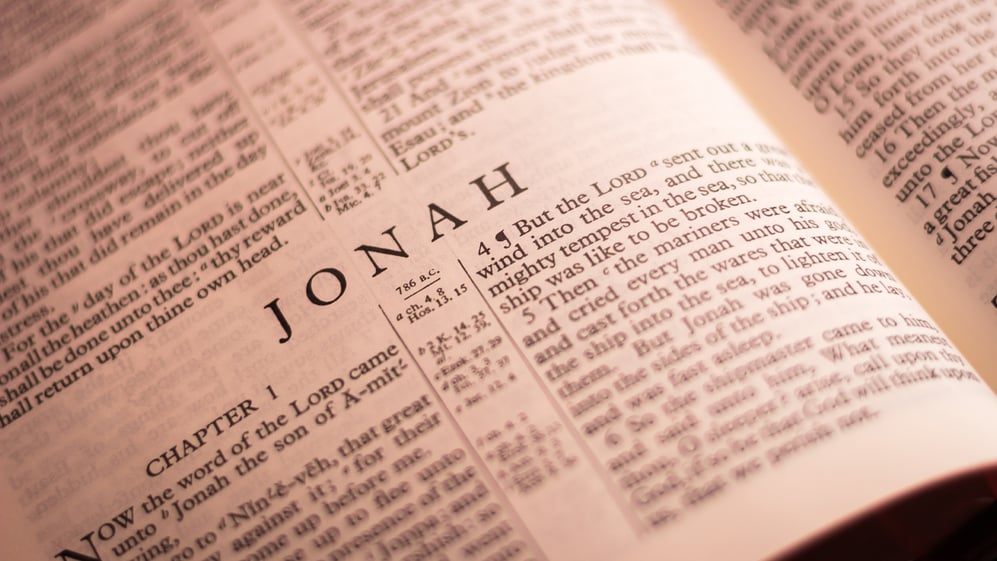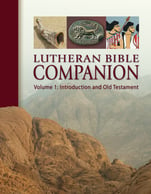The Book of Jonah applies the theme of repentance both to the prophet and to the people of Nineveh. The events related in the book explore the nature of God’s mercy and patience as well as the role of mankind in God’s mission. It is a story of both personal and national repentance. The following has been adapted from the Lutheran Bible Companion.
Genre
Jonah is an unusual member of “the Book of Twelve.” Commentators who are critical of the Bible have had a hard time deciding exactly what genre Jonah is.
At one time, critics called the book a “prophetic legend” and compared it with tales outside the Bible about Jonah and many other prophets. Possibly “prophetic novel” would describe the current critical view as well as any term. Certain British scholars (Cheyne, G. A. Smith, etc.) have explained the story as an allegory. They propose that Jonah represents Israel, whom God chose (Genesis 12:3) to convert the heathen. But instead, Israel has run away from its obligation. Most such allegorical approaches collapse when it comes to trying to work out all details. As a result, critics have also tended to favor the idea that Jonah is a parable, which is hardly different from allegory except that a parable may require fewer details for its interpretation.
The more traditional approach, which is preferable, reads the story of Jonah at face value as an artfully crafted historical narrative that describes real events from the prophet’s life.
Characters
As the namesake of the book, Jonah is the main character. The events of the book recount his travels and his reactions to the Lord, who is unrelenting in pursuit of His mission for Jonah. The sailors in chapter 1 are important to the story, not just for their role in tossing Jonah overboard but especially in illustrating the effect of the prophet’s message on the human heart. They turn from fearing the storm and divining God’s purposes by lot to fearing/trusting the Lord and making vows to Him. The Ninevites add further surprise to the story because they respond so fully to the Lord’s message through the half-hearted prophet. The book ends with the sailors and Ninevites trusting in the Lord, but with the prophet in despair because the Lord does not share his disdain for the enemies of Israel.
Specific Law Themes
The book opens with a common Old Testament theme: a nation’s evil, which has grown so steep it draws the Lord’s special attention (1:2). Jonah’s flight from God and his indifference to the Lord’s mission are likewise described as evil and provoke God’s wrath (1:8). Jonah comes to repentance only after being thrust down to “Sheol” (2:2). When Jonah finally reaches Nineveh, the message of God’s wrath drives the Assyrian leaders to fast and to wear sackcloth as expressions of their repentance. When Jonah finally has a chance to rest, God is not through with him. He appoints a test by which He will break the prophet out of his self-pity. God is everywhere, energetically changing people’s lives with the threats of the Law.
Specific Gospel Themes
The Book of Jonah beautifully reveals how God’s wrath serves His greater purpose of having mercy on Jonah, the sailors, and the Ninevites. In fact, God appoints mercy for Jonah through the blessings of creation. He abounds in steadfast love (4:2) and even turns/relents from “disaster” (literally, “evil”; 3:10). In the end, God’s pity and patience surprise the reader and would turn Jonah’s heart toward faith and trust (4:11).
Application
Jonah 1–2
When we break God’s Law and receive punishment, He often turns the situation into a learning experience and an opportunity for us to confess and praise Him. The apostle Paul, like Jonah, once felt that he had “received the sentence of death,” but the God “who raises the dead” delivered him (2 Corinthians 1:8–10). All sinners deserve the sentence of everlasting death. But the God to whom salvation belongs has, in Christ, rescued us and given us new life.
Jonah 3:1–5
Do you assume some people are unable or unwilling to respond to the Gospel? We have the immense privilege of sharing God’s Law and Gospel with the world around us. We have opportunities to be part of His plans. May we never be found guilty of neglecting our mission to make disciples of all nations. Faithfully fulfill your role as His witness. Leave conversion in God’s hands; He has promised that His Word will bear fruit, and He is concerned that all people have the opportunity to be saved. Thank God, His Word bore the fruit of repentance in Nineveh and also in your life.
Jonah 3:6–4:11
Jesus declared that “the men of Nineveh will rise up at the judgment … and condemn” His own generation of hearers who failed to repent (Matthew 12:41). God continues to call us to repentance for our sins of thought, word, and deed. The men of Nineveh furnish us with an example to follow. May they not condemn us on the Day of Judgment! May the Holy Spirit rather lead us daily to repent of our sins and trust Christ for pardon and peace.
Text adapted from the Lutheran Bible Companion, Volume 1: Introduction and Old Testament (pp. 907–13), © 2020 CPH. All rights reserved.
More on Jonah can be found in the Lutheran Bible Companion.














